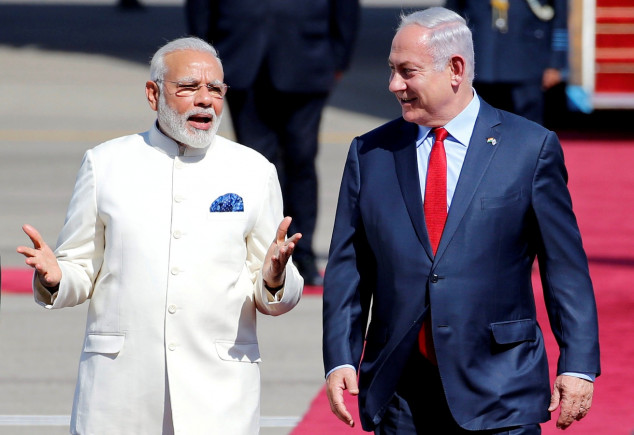
Israel and the U.S.
Israeli Prime Minister Benjamin Netanyahu toured the USS George H.W. Bush aircraft carrier, docked at Haifa port July 3. The carrier has been participating in the U.S. battle against ISIS. While aboard, Netanyahu spoke about the strong relationship between the two countries that goes beyond defense to a level of moral values and political-social ideals.
The new U.S. Ambassador to Israel, David Friedman, met with Palestinian Authority (PA) representatives at the King David Hotel in Jerusalem for talks on July 11. Trump’s personal adviser and son-in-law, Jared Kushner, and his special negotiations representative, Jason Greenblatt, also attended the meeting. The U.S. State Department described the meeting as “open, cordial, and frank.”
The Israel-U.S. Binational Industrial Research and Development (BIRD) Foundation will invest $7 million into eight new projects between Israel and the United States. The projects cover a wide range of fields, from biotechnology to homeland security. BIRD so far has funded 940 joint projects over its 40-year history.
Israel
Indian Prime Minister Narendra Modi visited Israel early July, making the first trip to Israel by any sitting Indian prime minister. Modi spent much of his time exploring and learning about Israel’s advanced horticulture, water, military industries, all of which India hopes to build upon at home. Modi also participated in an event for the thousands of Jews from India now living in Israel, while also paying his respects at the Yad Vashem Holocaust memorial and museum in Jerusalem with Netanyahu.
Allocations worth $420 million for maritime systems have been made to Israel’s navy in order to defend the country’s gas fields and shipping lanes. Currently, Israel defends waters 62 miles off its Mediterranean shore. This defense package is on top of the four Sa’ar-6 warships Israel recently acquired to protect the same waters.
Israeli Military Technology
Israel’s military will procure multiple, small multi-rotor remote-controlled drones equipped with a wide variety of military firearms. The drone known as TIKAD was developed by Duke Robotics, a defense contractor in Florida run by former Israeli military officers. Similar drones have been used in previous Israeli military operations, and are planned to minimize if not eliminate the danger soldiers are put in while performing operations with similar objectives.
Israel’s navy will add three advanced submarines to its fleet now that the German government approved a $1.5 billion sale on June 30. The three new Dolphin-class submarines will replace the current two Israel has, but it will take close to decade for the change to be completed.
Foreign Military Sales
India is in the process of finalizing a $1.9 billion defense deal with Israel’s large defense contractor, Israel Aerospace Industries (IAI), for 10 Heron TP drones and Spike anti-tank guided missiles. A second IAI defense agreement already has been signed with India’s Kalyani Strategic Systems worth $1.55 billion, according to the Federation of Indian Chambers of Commerce and Industry (FICCI). The deal includes air defense systems, radar, and anti-ship missiles. Both agreements came amidst India’s Prime Minister Narendra Modi’s groundbreaking visit to Israel.
Poland’s Defense Minister, Antoni Macierewicz, announced that Poland has signed a “memorandum of intent” to buy Israel’s David Sling missiles, using them in conjunction with the U.S. Patriot anti-missile system. The deal, which is expected to be concluded by this November, will cost Poland close to $8 billion, $1 billion of which will go to Israel’s Rafael Advanced Defense Systems. A single David Sling missile costs $450,000, in comparison to U.S.-based Raytheon’s $4.5 million cost per Patriot missile.
Elbit will provide a dozen Soltam M-71 155mm/39CAL Towed howitzers to the Philippine Army and Marines. The sale is reported to be worth $410 million and the weapons systems are already en route to the Philippines.
IAI, Dynamic Technologies, and Elcom Systems have signed a strategic cooperation agreement to address the need of Unmanned Aerial Vehicles (UAV) for India’s military. India has been working hard to keep its military technology ahead of the curve, while increasing its military capabilities, both of which the UAV accomplishes.

